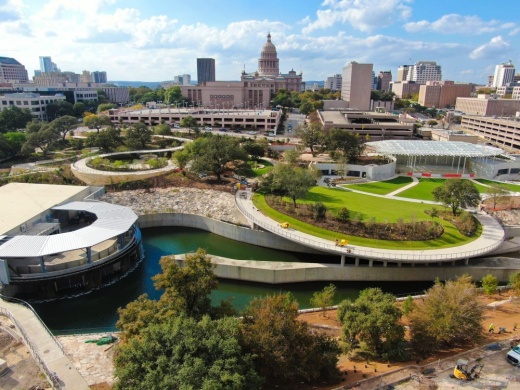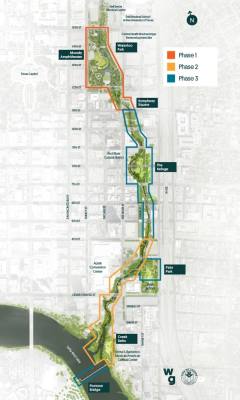CommUNITY Day, an event planned to celebrate the reopening of Waterloo Park after its shut down in 2011, has been postponed.
According to a spokesperson representing Waterloo Greenway Conservancy, the 11-acre park, located at 500 E. 12th St., Austin, will reopen to the public Aug. 14 at 10 a.m. despite the celebration's temporary delay.
Waterloo Greenway Conservancy, a non-profit that headed up planning of the festivities, canceled the event due to the COVID-19 delta variant creating a local surge in cases and hospitalizations.
Austin moved to Stage 5 of the Risk-Based Guidelines Aug. 5—the second time the city has breached that marker since Dec. 23.
As further evidence of mounting risk, data from the Texas Department of State Health Services map show Austin has 439 hospital beds and seven ICU beds available as of Aug. 13.
In light of emerging local threats from the pandemic, Waterloo Greenway Conservancy is encouraging all park guests to wear a face mask and practice social distancing.
CommUNITY Day festivities, which would have featured 18 local performing artists, will be rescheduled at a later date when it is safe to celebrate as originally planned, said Kathy Miller, interim CEO of Waterloo Greenway Conservancy.
“We made the necessary decision to cancel the celebrations in order to respect and protect the health of our community, which is the most important thing,” Miller said. “We don’t want any local artists to suffer a loss because we’ve canceled this. We want to celebrate together safely and build the showcase this park and this community deserves.”
Waterloo Greenway Conservancy is partnering with the city of Austin, Austin Parks and Recreation and Watershed Protection departments to build out the Waterloo Greenway project.
The partnership is releasing the project in three phases. When it is completed by the partnership’s 2026 goal, Waterloo Greenway will stretch from Lady Bird Lake to 15th St.
Waterloo Park is the first phase in the project, along with Symphony Square, and cost about $80 million to redevelop, Miller said. The estimated cost for the entire project is $265 million, according to the conservancy’s website.
The park will add unique value to the city during a time of explosive growth, Miller said.
“As more and more people move downtown, we believe creating a public green space will provide opportunities for everyone to connect with nature and be a part of the heart of downtown in a way that doesn’t cost a lot of money,” Miller said. “It makes it more attractive for people to be in this part of downtown that for so long has suffered from flooding.”
The original Waterloo Park closed in 2011 due to a consistent flooding problem in the area.
The Watershed Protection department of Austin built a large underground tunnel stretching one mile from 12th St. through Waller Creek to Lady Bird Lake. The department operates an inlet facility at the park which opens the floodgates of the tunnel as rain causes the water in Waller Creek to rise, Miller said.
“We’ve had lots of rain since the inlet facility has been operating, and the tunnel uses a filter to prevent debris from getting into Lady Bird Lake,” Miller said.
With the redevelopment completed, Miller said Waterloo Park bridges the gap between the past and the future.
“We’re going to have Austinites who have been here for a really long time who will remember the old park, and we’re going to have young folks who have never heard of Waller Creek or Waterloo Park,” Miller said. “We’ll also have kids playing in the playscapes who won’t even know what Spam is by the time they grow up.”






